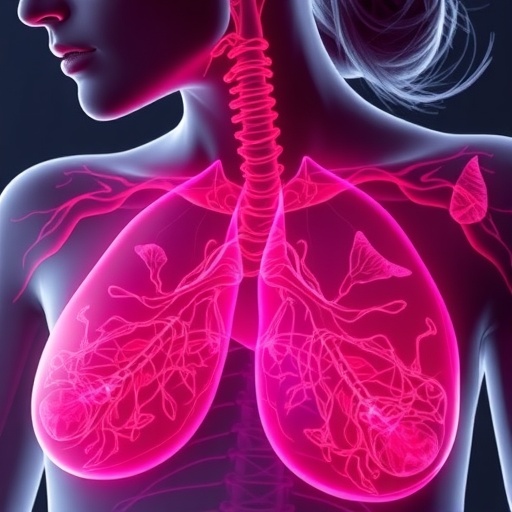In a groundbreaking study soon to be published in BMC Cancer, researchers have unveiled a novel approach to predicting breast cancer incidence risk by harnessing the power of machine learning algorithms applied to biochemical biomarkers. This innovative research marks a significant departure from traditional breast cancer risk models that primarily rely on personal demographics and medical history, incorporating instead a sophisticated analysis of blood-based biochemical data to enhance predictive accuracy.
Breast cancer remains one of the most prevalent and deadly malignancies worldwide, and early detection is crucial for improving patient outcomes. However, existing prediction tools often overlook the potential insights gained from biochemical markers present in peripheral blood. Recognizing this gap, the research team set out to construct a comprehensive model that integrates both clinical variables and biochemical indicators, employing advanced computational methods to uncover previously unrecognized risk factors.
The researchers curated a vast dataset comprising over 25,000 individual cases, which were meticulously screened and preprocessed to meet stringent inclusion and exclusion criteria. This careful normalization of data ensured the reliability and validity of subsequent analyses. The final dataset was split into two cohorts: a robust training group of 17,360 cases and an independent testing group composed of 8,551 cases, allowing for rigorous cross-validation of the predictive models.
At the heart of the study lies the application of logistic regression combined with six diverse machine learning algorithms. This ensemble approach enabled the identification and ranking of key variables associated with breast cancer incidence, evaluating each model’s performance using the area under the receiver operating characteristic curve (AUC) as a measure of discriminative ability. Such methodological rigor is paramount in ensuring clinically actionable insights.
Remarkably, the study demonstrated that two biochemical biomarkers stood out repeatedly across all models: gamma-glutamyl transferase (GGT) and alanine transaminase (ALT). Elevated levels of these enzymes were consistently linked to an increased risk of developing breast cancer. Logistic regression revealed a positive association, with age, GGT, and ALT all serving as statistically significant predictors. Specifically, every incremental rise in GGT and ALT corresponded with a subtle but meaningful increase in breast cancer incidence odds.
The importance of GGT and ALT lies in their biological roles and potential reflection of underlying pathological processes. GGT, an enzyme involved in glutathione metabolism, is critical in the body’s oxidative stress response, while ALT is a key enzyme in liver function. Their correlation with breast cancer risk hints at complex metabolic and inflammatory mechanisms possibly facilitating tumorigenesis, which merit further mechanistic exploration.
The machine learning models exhibited robust predictive power, with AUC values ranging from 0.779 to an impressive 0.862. Simultaneously, accuracy metrics spanned from 78.0% to 84.1%, underscoring the practical utility of these algorithms in discriminating between high-risk and low-risk individuals. This degree of performance signifies a substantial improvement over conventional risk models that often hover around more modest predictive capabilities.
Cross-validation with five folds ensured that the models’ findings were not artifacts of overfitting, enhancing confidence in their generalizability. Furthermore, the coherence between logistic regression and other more complex machine learning techniques attests to the robustness of GGT and ALT as predictive biomarkers, which might otherwise have been obscured in less nuanced analyses.
This study’s implications extend beyond theoretical prediction, laying the groundwork for precision medicine approaches in breast cancer risk assessment. By integrating routine blood tests measuring GGT and ALT, healthcare providers may soon have access to more refined risk stratification tools, enabling earlier interventions and personalized monitoring strategies tailored to biochemical profiles.
However, the authors caution that while these findings are promising, prospective validation in diverse populations and clinical settings is essential before clinical implementation. The study represents a crucial step toward integrating biochemical analytics into predictive oncology, but prospective trials are necessary to confirm utility and cost-effectiveness.
The intersection of machine learning and biomedical research has once again proven its potential to uncover subtle relationships hidden within complex datasets. This work exemplifies how computational advances can propel our understanding of cancer risk factors, previously confined to clinical observations and rudimentary statistics, into a new era of data-driven precision.
Future research directions proposed by the team include expanding the biomarker panel to encompass additional molecular signals, integrating genetic and lifestyle factors, and developing user-friendly predictive platforms accessible to clinicians. Such multifaceted approaches promise to revolutionize cancer prevention paradigms and ultimately improve survival outcomes globally.
Moreover, exploring the physiological underpinnings linking liver enzymes to breast cancer development could yield novel therapeutic targets. Understanding whether elevated GGT and ALT are causative or consequential will be pivotal in crafting intervention strategies aimed at modifying these biochemical pathways.
This pioneering study highlights the untapped potential of widely available blood tests, suggesting that routine biochemical screening could play a critical role in cancer prevention strategies. If corroborated, this approach could democratize risk assessment, making it more accessible and cost-effective, especially in resource-limited settings.
In summary, the integration of biochemical biomarkers with machine learning algorithms presents a promising frontier in breast cancer risk prediction. By moving beyond traditional risk factors and embracing complex biological data, researchers have opened new avenues to identify individuals at heightened risk, paving the way for earlier detection and improved clinical outcomes.
Subject of Research: Breast cancer risk prediction using machine learning algorithms based on biochemical blood biomarkers.
Article Title: Machine learning algorithms predict breast cancer incidence risk: a data-driven retrospective study based on biochemical biomarkers
Article References:
Guo, Q., Wu, P., He, J. et al. Machine learning algorithms predict breast cancer incidence risk: a data-driven retrospective study based on biochemical biomarkers. BMC Cancer 25, 1061 (2025). https://doi.org/10.1186/s12885-025-14444-x
Image Credits: Scienmag.com




